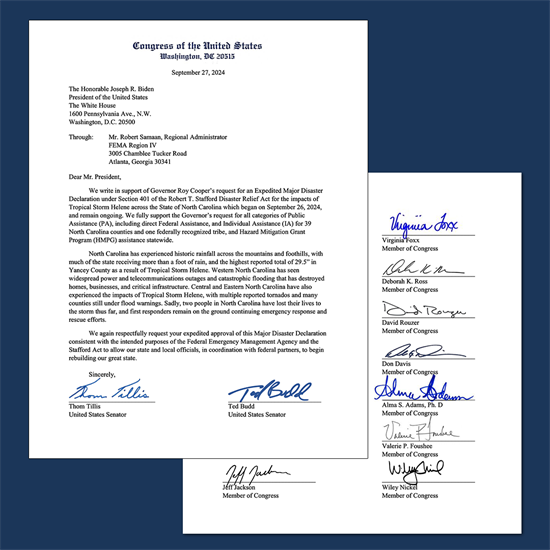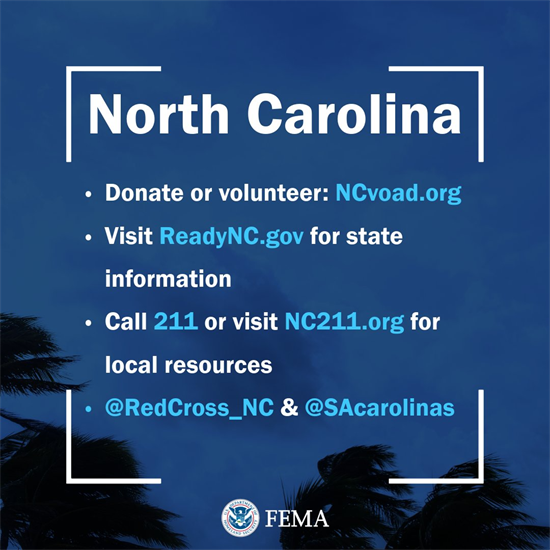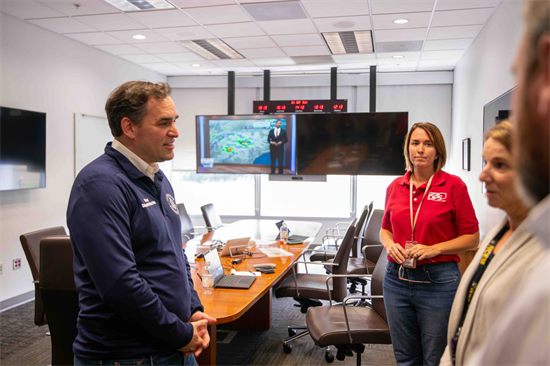Dear Neighbor,
Hurricane Helene has left a devastating mark on communities across our state. I want to express my deepest gratitude to the brave men and women working tirelessly on the front lines to help North Carolina recover. I'm committed to securing every available federal resource to support our search and rescue teams, first responders, and those impacted by this disaster.
Below you'll find essential information on federal relief programs and resources available to help those affected. |
This week, I joined with the entire North Carolina delegation in urging President Biden to declare a Major Disaster Declaration for our state. President Biden approved the order, which allowed for a surge of federal resources to 25 impacted counties. |
- Currently, more than 3,300 personnel from across the Federal workforce are deployed and supporting Hurricane Helene response efforts across the impacted states.
- At least 50,000 personnel from 31 states and the District of Columbia and Canada are responding to power outages and working around the clock throughout parts of Florida, Georgia, North Carolina, and South Carolina to restore power to those communities that can receive power. The U.S. Army Corps of Engineers is moving generators and additional power generation assets into the hardest hit areas of South and North Carolina as flood waters recede and debris removal allows.
- FEMA distribution centers are fully stocked and ready to provide commodities and equipment to any impacted state, as required.
- FEMA is trucking dozens of trailers containing food and water in North Carolina to support the State as they start to set up care-sites for survivors.
- FEMA is also working with the Federal Communications Commission and private sector telecommunications partners to deploy emergency mobile communications assets while they work to restore network services, particularly in remote areas.
- The U.S. Department of Energy has responders deployed across the region and are closely monitoring power, fuel, and supply chain interruptions.
- The U.S. Department of Agriculture’s Farm Service Agency has deployed personnel to the impacted region to extend much-needed emergency credit to farmers and agriculture producers who lost crops and livestock.
|
People are urged to stay off Western North Carolina roads so that emergency responders, utility crews, and desperately needed supplies can get through.
Real time road conditions are available at drivenc.gov. |
The Red Cross can help you reconnect with loved ones missing because of Hurricane Helene. If someone: - Has a serious, pre-existing health, mental health condition or Functional and Access Need;
- Is a member of the military-connected community (active duty, reserve, guard, retiree, veteran, or immediate family member);
- Or you shared the same residence within the disaster impact area, or have recently been in contact with someone (within the past year) but are unable to reach them because of the disaster;
- Call 1-800 RED CROSS (1-800-733-2767) and provide as much detail available to assist us in potentially locating your missing loved one. More information is available here.
|
Homeowners and renters in Alexander, Alleghany, Ashe, Avery, Buncombe, Burke, Caldwell, Catawba, Clay, Cleveland, Gaston, Haywood, Henderson, Jackson, Lincoln, Macon, Madison, McDowell, Mitchell, Polk, Rutherford, Transylvania, Watauga, Wilkes and Yancey counties and the Eastern Band of Cherokee Indians can apply.
There are several ways to apply: Go online to DisasterAssistance.gov, use the FEMA App or call 800-621-3362 from 7 a.m. to 11 p.m. ET daily. The telephone line is open every day and help is available in most languages. If you use a relay service, such as Video Relay Service (VRS), captioned telephone or other service, give FEMA your number for that service. |
To all those impacted in our district, you can call my Washington, D.C. Office at 202-225-4531 or my Garner District Office at 984-275-6150. |
Yesterday, I was briefed by North Carolina Emergency Management on the status of recovery efforts. I’ll keep fighting to ensure they have all the federal resources needed to support search and rescue teams and first responders. |
|




